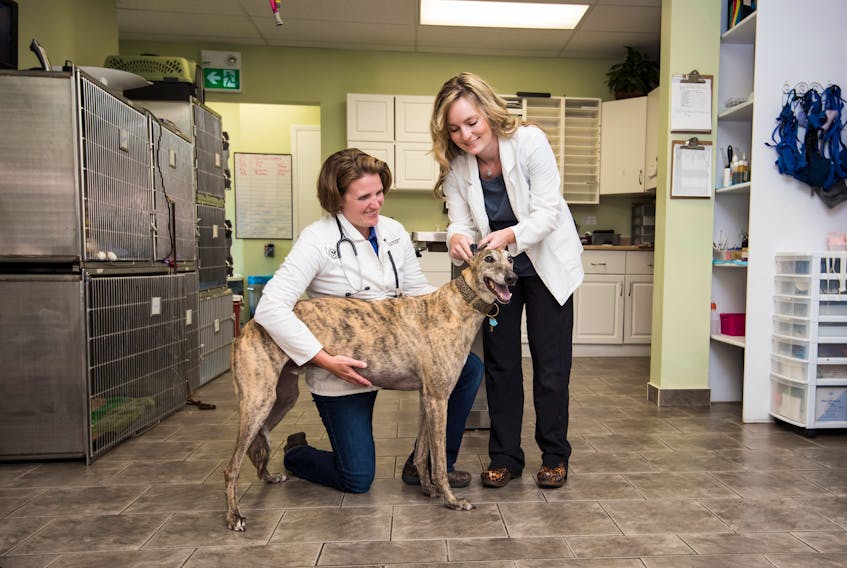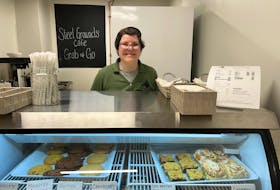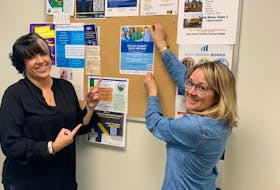The two veterinarians behind the East Hants Animal Hospital are expanding the business after growing their market share during the COVID-19 pandemic.
Revenues are twice as high as they were at this time last year, said Dr. Courtney Sherlock.
The two-storey animal hospital on Highway 214 in Elmsdale was established a year and a half ago and has the equivalent of two full-time vets.
Throughout the pandemic, it never completely shut down.
“We wanted to be able to take the opportunity to grow, and with the COVID-19 restrictions in place we were able to add more people,” said Sherlock, who also owns a longstanding veterinary hospital in Eastern Passage.
It has also seen explosive growth during the pandemic, with revenue climbing as much as 60 per cent.
The lockdown imposed in March continued through early June. During those months, veterinarians could not see patients except for emergencies.
Spaying and neutering, nail trimming and the administration of vaccines are usually a vet’s bread and butter. That business evaporated during the lockdown.
Action avoiding layoffs
At the East Hants Animal Hospital, Sherlock and Dr. Crystal Craig took immediate action when the pandemic hit.
First, they deferred business loans and Sherlock’s personal mortgage. Sherlock stopped drawing a salary and applied for Ottawa’s $40,000, interest-free Canada Emergency Business Account loan. Up to $10,000 of that is forgivable if it is repaid by the end of 2022.
“This was all in anticipation of freeing up cash flow so we could avoid layoffs if we were forced to close,” she said.
Then, as many animal hospitals started to cut back on staff and reduce their services, the two entrepreneurs took a completely different tack. They sought opportunities to expand their services, extended their hours and added staff.
“We immediately started offering free delivery every day to any of our clients – no limits on distance or money spent – so that their pets wouldn’t go without the supplies they needed while people were stuck at home,” said Sherlock.
Pet owners could order food or other supplies online. Payment was done by credit card over the phone.
“If the clients preferred, they could do curbside pickup,” said Sherlock.
“We quickly numbered our parking spaces and set out designated containers in our front reception by last name where ordered products were kept with receipts and could easily be brought out to clients upon arrival.”
During the lockdown, the two vets also started to receive patients at the curb.
Curbside service
Cats needing medical care would be placed outside the owner’s car in a carrier and picked up by staff, allowing everyone to socially distance. Dogs would be brought out on a leash and then, as the dog approached the business, transferred to another leash and taken indoors.
“We increased the access to phone lines and utilized the services of an answering service to ensure our clients didn’t receive a busy signal,” said Sherlock.
“We added telemedicine appointments where appropriate, were creative with seeing clients in person using socially distanced space outside . . . and had clients accessing our building through our side doors so they would not encounter any other people,” she said.
Within four weeks of the end of lockdown, both animal hospitals had not only caught up on delayed elective veterinary procedures but also increased their client bases. Pet owners who were unable to see their regular vet in an acceptable time frame started to turn to them.
“All the while, we continued to see all of our urgent and emergency cases with same-day appointments and grew our client base of people getting new pets or unable to get in to see their regular veterinarian,” said Sherlock.
The animal hospitals together have about 10,150 square feet of space for examination rooms, surgical suites, kennels, cat boarding and office space. The business employs 37.
“Of those, eight full-time positions have been added since March in order to provide timely service to our growing customer base,” said Sherlock.
The privately-held business does not divulge revenue or profit figures, but the veterinary team is clearly doing a booming business. They said they are in the black and eyeing expansion for early next year. In February, they are planning to open the Bedford Parks Animal Hospital in a 4,000-square-foot leased space.
In the summer, the two hope to open the North End Animal Hospital in Halifax. Roughly 60 per cent of that 10,000-square-foot building, which the entrepreneurs will own, is to be used for the hospital.
Those hospitals will almost triple the current space Sherlock and Craig jointly own and lead to the addition of 14 jobs.
Sherlock credits the strong work ethic of her employees for helping the company thrive during the pandemic.
“We’re successful because our team stuck by us and helped us through it,” she said.
That sense of teamwork has been carefully cultivated through corporate programs and policies. There are wellness seminars in which guest speakers talk about yoga and nutrition. There is a library of wellness books for any employee to borrow. The company offers no-questions-asked pay advances and conducts anonymous monthly employee morale surveys.
“We also celebrate every new hire,” said Sherlock.
Starting a job at the East Hants Animal Hospital? Expect balloons and messages of congratulations and posts on Facebook.
The business works hard to retain employees.
“This is a problem some other places face,” said Sherlock.
“People might feel ‘I don’t feel appreciated. I might as well go home and collect CERB.’”
Sherlock and Craig have no intention of changing the ways they’ve adapted during the crisis.
“We are continuing with the curbside offerings, telemedicine and delivery services if it helps our clients in any way and plan to keep these services,” said Sherlock.
The Pivot is a regular feature about an Atlantic Canadian company adapting to new market realities with innovative products, services or strategies. To suggest a business, email: [email protected].









